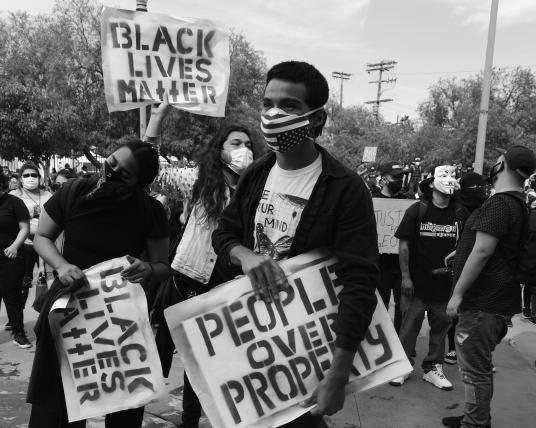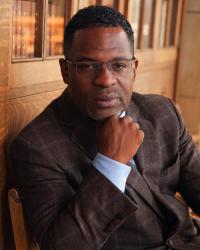
We are at a defining moment in history. Protests continue to sweep across the United States following the murders of George Floyd in Minneapolis, Breonna Taylor in Louisville, and countless others at the hands of the police. In Seattle, a place with our own problems with blue on black violence (e.g., Charleena Lyles), protesters chanted “Black Lives Matter.” Many were even subjected to tear gas. The National Guard was activated in Seattle for the first time in 20 years. The protests have sparked nationwide conversations about the efficacy of policing and punishment, the long history of systemic racism, and the current arrangement of political institutions which contribute to the devaluation of black lives.
The present moment highlights the large gulf in knowledge about the history of Black people in the United States, and their lived experiences today. As professors of political science, we believe education is central—not just to becoming more politically informed—but to better understand the world around us, and to work towards a stronger democracy. In order to understand how to repair harm and move to a more just society, we must first understand how we got here in the first place. Educating ourselves by listening to Black people as they share their truths are important first steps in responding to the present crisis. However, we hope that you do not stop there—we hope that you put what you learn into practice and become involved in your community around organizing for a more just future for all.
The Political Science Department at the University of Washington, our students, and our alumni are part of our community. To provide some insight on the current moment, we have written short reflections on the protests and provided a list of recommended readings.
All of the contributors are key members of the Washington Institute for the Study of Inequality and Race (WISIR). WISIR is an interdisciplinary research center that seeks to enhance public understanding of issues related to race, ethnicity, and inequality, as well as contribute to solutions. If you feel so moved, please give to WISIR to help us build public programming, pursue critical research on racism, racial violence, and structural inequities, and enhance WISIR's role in creating a welcoming and just learning environment at the University of Washington. Make a gift.
Prof. Christopher Sebastian Parker
Could THIS time Be different?
Prof. Megan Ming Francis
The Mattering of Black Lives
Prof. Sophia Jordán Wallace
The Intersection of Protests, COVID-19, and Structural Racism
Prof. Jacob Grumbach
Do Not Forget this Moment
Prof. Michael McCann
Racist Police Violence: Toward a Socio-legal Institutional Analysis
Prof. Rebecca Thorpe
Repression and Resistance
Prof. Jack Turner
White Eyes / Black Citizenship


Recommended Readings
White Rage: The Unspoken Truth of the Racial Divide by Carol Anderson (2017)
“A Report from Occupied Territory” (1966) by James Baldwin, in Baldwin: Collected Essays (1998)
Race After Technology: Abolitionist Tools for the New Jim Code by Ruha Benjamin (2019)
Racism without Racists: Color-Blind Racism and Persistence of Racial Inequality in America by Eduardo Bonilla-Silva (2009)
Eloquent Rage by Brittney Cooper (2019)
White Fragility: Why It’s So Hard for White People to Talk about Racism by Robin DiAngelo (2018)
Civil Rights and the Making of the Modern American State by Megan Ming Francis (2014)
Reading Rodney King / Reading Urban Uprising, edited by Robert Gooding-Williams (1993)
The Loud Minority: Why Protests Matter in American Democracy by Daniel Gillion (2020)
The Political Power of Protest by Daniel Gillion (2013)
From the War on Poverty to the War on Crime: The Making of Mass Incarceration in America by Elizabeth Hinton (2017)
“Black Lives Matter and the Paradoxes of U.S. Black Politics: From Democratic Sacrifice to Democratic Repair,” by Juliet Hooker, Political Theory 44, no. 4 (2016)
The Broken Heart of America by Walter Johnson (2020)
How to be an Antiracist by Ibram X. Kendi (2019)
Ella Baker and the Black Freedom Movement by Barbara Ransby (2003)
Invisible No More: Police Violence Against Black Women and Women of Color by Andrea Ritchie (2017)
“Ferguson and the Tragic Presence of the Past: A Collection,” edited by Melvin L. Rogers, Theory & Event 17, no. 3 (Supplement) (2014)
The Color of Law: A Forgotten History of How Our Government Segregated America by Richard Rothstein (2017)
Black is a Country: Race and the Unfinished Struggle for Democracy by Nikhil Pal Singh (2004)
Race for Profit: How Banks and the Real Estate Industry Undermined Black Homeownership by Keeanga-Yamahtta Taylor (2019)
From #Black Lives Matter to Black Liberation by Keeanga-Yamahtta Taylor (2016)
“North American Necropolitics and Gender: On #BlackLivesMatter and Black Femicide”, South Atlantic Quarterly 116(3):553-579 By Shatema Threadcraft (2017)
A More Beautiful and Terrible History: The Uses and Misuses of Civil Rights History by Jeanne Theoharis (2019)
From the Bullet to the Ballot: The Illinois Chapter of the Black Panther Party and Racial Coalition Politics in Chicago by Jakobi Williams (2013)




